

ZyLAB
ZyLAB ONE eDiscovery uses Artificial Intelligence and Data Science tools to facilitate fact-finding missions through large or small electronic datasets related to the business-critical projects of governmental agencies, law firms, and companies of any size.
5 tips to efficiently handle regulatory information requests. Regulatory requests are the number one reason for eDiscovery worldwide.
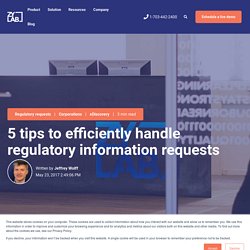
These requests for information and documentation from regulatory bodies or external auditors come unannounced and can be very disruptive. Traditionally, these investigations were driven by competition and anti-trust violations. However, in recent years (new) regulators have started conducting similar disruptive requests and investigations related to other issues such as bribery, fraud, environmental or healthcare violations, data privacy and consumer protection matters, and many other regulated fields. As a result, regulators, courts and law enforcement authorities worldwide have developed an apparently insatiable appetite for access to data held by corporations.
The number and value of fines is on a steep increase, so companies need to be better be prepared. Tip #1 – Make sure your answers are complete, accurate and timely. Why SaaS eDiscovery is a natural fit for law firms? Law firms are under pressure to offer excellent service and to control budgets at the same time.
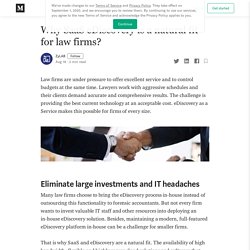
Lawyers work with aggressive schedules and their clients demand accurate and comprehensive results. The challenge is providing the best current technology at an acceptable cost. eDiscovery as a Service makes this possible for firms of every size. Do not underestimate the magnitude of a regulatory request. In this week’s ACEDS webinar “Efficiently Handling Regulatory Requests”, ACEDS’s executive director Mary Mack and Johannes Scholtes (CSO ZyLAB), were joined by May Tal Gongolevsky, Counsel E-Discovery Advocacy and Management Team with Baker & Hostetler LLP.
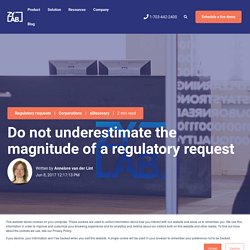
Gongolevsky counsels clients on issues relating to electronic discovery, data privacy, software licensing, and handling regulatory requests. Her advice: “Do not underestimate the magnitude of a regulatory request”. Regulatory requests are the number one reason for eDiscovery worldwide. Opposed to civil litigation the magnitude of regulatory information requests usually is greater.
Where you can negotiate the number of custodians, data types and sources in civil litigation, regulating agencies seem to expand the universe and have a bigger appetite when it comes to data. “Not all vendors are created equal” AI-based eDiscovery analytics - beyond the buzz. "AI-based eDiscovery Analytics", Augmented Intelligence”, “Advanced Predictive Analytics”, “The Robot-Lawyer”: we all hear the buzz.
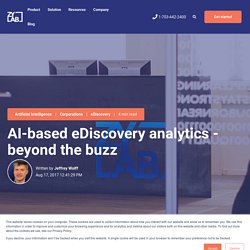
Artificial intelligence (AI) is steadily revolutionizing the legal profession and advances in AI-based analytics now drastically increase the speed and improve the quality of the eDiscovery process. The use of AI and analytics in eDiscovery however has been good practice for years. In this blog, we will elaborate on new AI-based analytics techniques and how they compare to other analytics we have been using for years. Terminology First some terminology. “Analytics” is the discovery, interpretation, and communication of meaningful patterns in data. AI-based eDiscovery analytics - beyond the buzz. Questions you need to ask before buying an eDiscovery solution. When selecting an eDiscovery software solution, law firms and corporate legal operations departments are liable to face seemingly endless options.
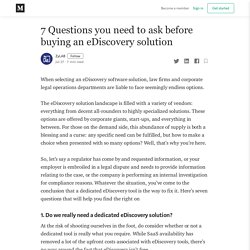
The eDiscovery solution landscape is filled with a variety of vendors: everything from decent all-rounders to highly specialized solutions. These options are offered by corporate giants, start-ups, and everything in between. For those on the demand side, this abundance of supply is both a blessing and a curse: any specific need can be fulfilled, but how to make a choice when presented with so many options? Well, that’s why you’re here. So, let’s say a regulator has come by and requested information, or your employer is embroiled in a legal dispute and needs to provide information relating to the case, or the company is performing an internal investigation for compliance reasons. 1.
At the risk of shooting ourselves in the foot, do consider whether or not a dedicated tool is really what you require. 2. How the GDPR brings a new dimension to eDiscovery. Since the end of May 2018, the GDPR regulates all activities involving the personal data of EU citizens.
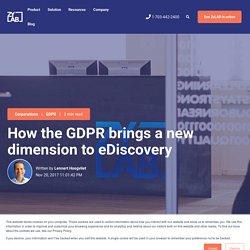
Under this regulation, companies around the world are only allowed to process and store data of European citizens if they can prove compliance with the strict rules of this regulation. It does not matter if you are a European company or not; the new GDPR will bring substantial changes and compliance challenges for every organization that collects, processes, stores, and transfers personal data, anywhere in the world. Why the launch of the ACEDS Benelux Chapter is good news. The Association of Certified E-Discovery Specialists (ACEDS) soon launches its Benelux Chapter, the first professional eDiscovery Community in the region.

ACEDS is the member organization for professionals in the private and public sectors who work in the field of eDiscovery. Although the term “eDiscovery” in the Benelux is less common than in the US, the process of eDiscovery forms the basis of every large or international data investigation for compliance, M&A, fraud or regulatory cases. Increasing importance of eDiscovery in the Benelux The launch of an ACEDS Chapter in the Benelux marks the growing importance of eDiscovery in Dutch and Belgium corporate business practices. Initially, eDiscovery (the search of large quantities of electronic data for a specific purpose) was mainly used in legal investigations or litigation. Today, eDiscovery is also used for other purposes. At the same time, eDiscovery gets a more proactive character.
Membership: “Networking, Education, Career” No silver bullet to cover all GDPR requirements... The General Data Protection Regulation (GDPR) that becomes effective end of May this year will have severe impact on how companies and government organizations have to operate when dealing with information from citizens and other subject in the European Union.
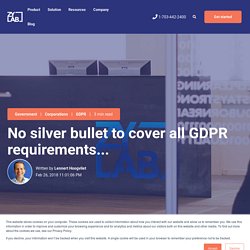
We all know that non-compliance with this new and strict data-protection regime comes with severe penalties, so doing nothing, is not an option. There simply is no one solution to address all aspects of the GDPR. The new regulation covers too many aspects of data protection, privacy and information rights. Where GDPR meets eDiscovery, part 2: the difference between anonymization and pseudonymization. In last week’s blog, we discussed storing archives that are often subject to regulatory requests or eDiscovery.
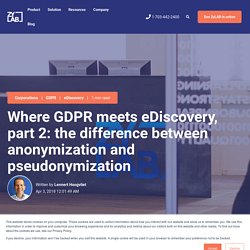
Redaction and anonymization are very practical and cost-effective means for GDPR-compliant storing of data repositories and archives that are often subject to regulatory requests or eDiscovery. Watch the webinar Crucial steps Anonymization and pseudonymization become crucial when you need to transfer data outside of the EU to respond to regulatory or eDiscovery requests. Or when parties outside of the European Union need to access data rooms in the EU for M&A, real estate or litigation reviews. True anonymization however, poses a difficult standard for most organizations. With pseudonymization, data can no longer be attributed to a data subject. Try it yourself With ZyLAB’s technology the cost of redaction and pseudonymization is significantly lower than manual work, also it is faster, better and smarter. Where GDPR meets eDiscovery, part 1: storing archives that are often subject to regulatory requests or eDiscovery. The high number of participants in last week’s ACEDS webinar shows there is a lot of interest for the new legislation that becomes effective end of May this year.
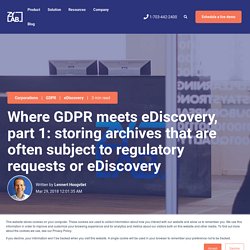
The Q&A session also learned people struggle to grasp what they really must do in order to meet the requirements of the new General Data Protection Regulation in May 2018. With good reason. The General Data Protection Regulation will have great impact on how companies and government organizations manage digital information when dealing with information from citizens in the European Union.
In the webinar (recording is available here) moderated by Mary Mack, Kenneth Rashbaum and Johannes Scholtes discuss what organizations can do to address the most notorious GDPR requirements. No silver bullet. The race to leniency: gain an advantage in antitrust investigations. Racing against the clock is something everyone in the legal profession is well acquainted with. Deadlines, court orders, and many other time-sensitive aspects of the process make moving as swiftly as possible essential to success.
That need for speed is exactly why deploying a wide range of legal technology solutions so valuable: they allows legal professionals a head start in the process. In antitrust (as referred to in the United States of America) or competition (the European term used) investigations, as time goes by, the chance of harsher implications increases. Takeaways from CLOC: legal operations as new competance for general counsel. We've said before that understanding of technology is increasingly becoming an important skill for the modern General Counsel.
Last week we were at the annual conference of the Corporate Legal Operations Consortium (CLOC) in Las Vegas where the CLOC Legal Operations Maturity Model was presented. We learned about the evolving corporate function called Legal Operations, which is a function that helps the General Council deal with the ever increasing breadth and complexity of his or her role. Legal Operations: everything except the law Legal Operations is a multidisciplinary department, typically reporting into the General Council, that is charged with optimizing legal services within an organization. Increasingly the Legal Operations portfolio is expanding to include compliancy, security and other risk-related areas. Utilizing eDiscovery tools for internal investigations. As corporations look to consolidate the number of applications utilized to support their businesses, parallels in the use cases of existing solutions across the enterprise can be better leveraged.
Case in point, eDiscovery applications, once thought to be the domain only of legal or the corporate counsel’s office can be used by IT/IS departments as well as Human Resources for internal investigations. Such investigations do not typically involve the full eDiscovery suite, as there is often no need to produce/export data to counsel for review. However, collecting, processing and reviewing data related to an HR matter or ensuring that sensitive or critical information data is not accessible to those who should not have access, is still within the wheelhouse of an eDiscovery solution. Find What You Do Not Know What You Look For When you do not know what you are looking for, keyword searching is not particular efficient as a means to begin your review process.
The Ease of One Single Platform. Reduce legal fees by taking control of your eDiscovery. When in-house counsel are fed up with $600 per hour billings from outside law firms for time spent struggling (and too often failing) to meet today’s eDiscovery needs, the question naturally arises: How can we reduce outside legal spend, especially on fees for inefficient services? You’re invited to watch our free webinar “Reducing Legal Spend” as Adam Platt, Senior eDiscovery Analyst at FirstBank, discusses the answer to this and other eDiscovery questions with ZyLAB CSO, Johannes Scholtes, and Mary Mack from ACEDS.
Preparing for the transition The need for solutions that reduce outside legal fees is a key part of what drives corporate counsel forward as leaders in legal innovation. And because they value results over tradition, many have already discovered the most effective solution: Move eDiscovery processes in house where they can be better managed using advanced technologies proven to cut costs and improve efficiencies. Pinpoint which eDiscovery processes have the highest payoff. 7 Questions you need to ask before buying an eDiscovery solution. When selecting an eDiscovery software solution, law firms and corporate legal operations departments are liable to face seemingly endless options.
The eDiscovery solution landscape is filled with a variety of vendors: everything from decent all-rounders to highly specialized solutions. These options are offered by corporate giants, start-ups, and everything in between. For those on the demand side, this abundance of supply is both a blessing and a curse: any specific need can be fulfilled, but how to make a choice when presented with so many options? Well, that’s why you’re here. So, let’s say a regulator has come by and requested information, or your employer is embroiled in a legal dispute and needs to provide information relating to the case, or the company is performing an internal investigation for compliance reasons. 1.
At the risk of shooting ourselves in the foot, do consider whether or not a dedicated tool is really what you require. 2. Rethink eDiscovery - it no longer sucks! If pushed, you can probably list several benefits of using eDiscovery technology when reviewing large amounts of electronically stored information (ESI). You’ll know that the technology is typically faster, cheaper and more reliable than using human reviewers to do the work. Preventing the high costs of eDiscovery in litigation, audits, and internal investigations. Companies today are receiving pressure from all sides, exacerbating the costs of an already expensive process – eDiscovery. Rising pressure from the increased use of data, domestic and international regulations, globalization, changing business models, more educated thus demanding clients and employees, and changing data protection and privacy laws have resulted in many in-house legal teams feeling overwhelmed when faced with cases necessitating eDiscovery.
3 reasons eDiscovery isn't just for litigators anymore. E.D. phone home - taking control of eDiscovery. The mental health of attorneys has been getting lots of press coverage lately. A work culture steeped in long hours, crazy deadlines, and insane billable hours targets is devouring and spitting out highly-talented attorneys at an alarming rate. Why now is the perfect time to take control of your eDiscovery. How to cut eDiscovery costs without increasing risk. For company’s General Counsel, protecting the company’s good name is key. Part of that protection is (co-)coordinating IT’s decisions about corporate data collection and storage platforms with the CFO’s mandates about controlling cost.
Those decisions have very real legal implications only you can accurately assess. Inefficient and ineffective data collection and review processes could put the company’s future at risk, and simply throwing more resources, like outside counsel, at the problem doesn’t necessarily mitigate that risk. What can be done? Why controlling eDiscovery costs is possible. Why controlling eDiscovery costs is possible. ZyLAB offers 60 days of free, unrestricted access to ZyLAB ONE eDiscovery. As the evolving COVID-19 situation forces more and more work to be done remotely, corporations need a way to continue their legal discovery, internal investigations and regulatory responses. Working away from the office can be a challenge, and with many decisions being made and safety measures taken, organizations need to continue their work in more independent and self-service capacity.
ZyLAB would like to lend a (digital) hand, which means that effective immediately, we’re offering 60 days of full, unrestricted and free access to our solution as long as the pandemic makes work harder to do. Organizations that join during this time will enjoy free, unrestricted access to ZyLAB ONE, our cloud-based solution for that allows corporations to quickly and efficiently ingest, analyze, review, redact and produce data related to internal investigations, regulatory responses and legal discovery. To help avoid backlogs and missed deadlines, our offer includes: ZyLAB offers 60 days of free, unrestricted access to ZyLAB ONE for governments and agencies. As the evolving COVID-19 crisis forces more and more measures taken by governments, government officials and agency workers at all levels are faced with new challenges every day.
Why taking control of eDiscovery should (also) be an IT initiative. 3 reasons taking control of eDiscovery benefits project teams. Building a business case to take control of eDiscovery. PRA End of the Year Survey: identification and collection most burdensome. Building a business case for taking control of eDiscovery. The growing importance of eDiscovery for corporate counsel.
How taking control of eDiscovery can minimize IT headaches. Webinar - AI in eDiscovery - Going Way Beyond TAR & Predictive Coding. Webinar - Preparing for the General Data Protection Regulation (GDPR) Webinar - Optimizing Your Public Disclosure & FOIA Response Process. Webinar - eDiscovery and Information Governance in the Age of Cloud Computing. Webinar - Optimizing your FOIA Request Process from Start to Finish. Mind the gap: why outsourcing and IT tools hamper eDiscovery. Assisted Review - let IT cut through the tech hype. Assisted Review - let IT cut through the tech hype. Social media’s impact on public records requests. Subject Access and Right to be Forgotten Requests. Keep control over your data when information requests come in! Leave the past behind: the right tools for efficient eDiscovery are here. Corporate counsel’s journey to efficient in-house eDiscovery. The eDiscovery project manager's path to long-term success. The growing importance of eDiscovery for corporate counsel.